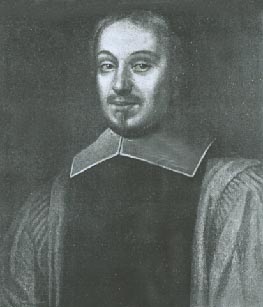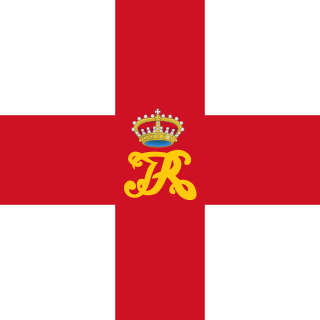
The Massachusetts Bay Colony (1628–1691), more formally the Colony of Massachusetts Bay, was an English settlement on the east coast of North America around the Massachusetts Bay, one of the several colonies later reorganized as the Province of Massachusetts Bay. The lands of the settlement were in southern New England, with initial settlements on two natural harbors and surrounding land about 15.4 miles (24.8 km) apart—the areas around Salem and Boston, north of the previously established Plymouth Colony. The territory nominally administered by the Massachusetts Bay Colony covered much of central New England, including portions of Massachusetts, Maine, New Hampshire, and Connecticut.

Sir Edmund Andros was an English colonial administrator in British America. He was the governor of the Dominion of New England during most of its three-year existence. At other times, Andros served as governor of the provinces of New York, East and West Jersey, Virginia, and Maryland.

Theophilus Eaton was a wealthy New England Puritan merchant, diplomat and financier, who took part in organizing and financing the Great Puritan Migration to America. He was a founder of Massachusetts Bay Colony, and a founder and eventual governor of New Haven Colony. He also cofounded the town of Greenwich in Connecticut and Eaton's Neck in New York.

The New Haven Colony was a small English colony in Connecticut from 1638 to 1664, with outposts in New York, New Jersey, Pennsylvania, and Delaware.

The Province of Massachusetts Bay was a colony in New England which became one of the thirteen original states of the United States. It was chartered on October 7, 1691, by William III and Mary II, the joint monarchs of the kingdoms of England, Scotland, and Ireland, and was based in the merging of several earlier British colonies in New England. The charter took effect on May 14, 1692, and included the Massachusetts Bay Colony, the Plymouth Colony, the Province of Maine, Martha's Vineyard, Nantucket, Nova Scotia, and New Brunswick; the Commonwealth of Massachusetts is the direct successor. Maine has been a separate state since 1820, and Nova Scotia and New Brunswick are now Canadian provinces, having been part of the colony only until 1697.
John Haynes, also sometimes spelled Haines, was a colonial magistrate and one of the founders of the Connecticut Colony. He served one term as governor of the Massachusetts Bay Colony and was the first governor of Connecticut, ultimately serving eight separate terms. Although Colonial Connecticut prohibited Governors from serving consecutive terms at the time, "John Haynes was so popular with the colonists that he served alternately as governor and often as deputy governor from 1639 to his death in 1653."

Richard Bellingham was a colonial magistrate, lawyer, and several-time governor of the Massachusetts Bay Colony, and the last surviving signatory of the colonial charter at his death. A wealthy lawyer in Lincolnshire prior to his departure for the New World in 1634, he was a liberal political opponent of the moderate John Winthrop, arguing for expansive views on suffrage and lawmaking, but also religiously somewhat conservative, opposing the efforts of Quakers and Baptists to settle in the colony. He was one of the architects of the Massachusetts Body of Liberties, a document embodying many sentiments also found in the United States Bill of Rights.

Joseph Dudley was a colonial administrator, a native of Roxbury in Massachusetts Bay Colony, and the son of one of its founders. He had a leading role in the administration of the Dominion of New England (1686–1689), which was overthrown in the 1689 Boston revolt. He served briefly on the council of the Province of New York, from which he oversaw the trial which convicted Jacob Leisler, the ringleader of Leisler's Rebellion. He then spent eight years in England in the 1690s as Lieutenant-Governor of the Isle of Wight, including one year as a Member of Parliament for Newtown. In 1702, he returned to New England after being appointed governor of the Province of Massachusetts Bay and Province of New Hampshire, posts that he held until 1715.

The Dominion of New England in America (1686–1689) was an administrative union of English colonies covering all of New England and the Mid-Atlantic Colonies, with the exception of the Delaware Colony and the Province of Pennsylvania. The region's political structure was one of centralized control similar to the model used by the Spanish monarchy under the Viceroyalty of New Spain. The dominion was unacceptable to most colonists because they deeply resented being stripped of their rights and having their colonial charters revoked. Governor Edmund Andros tried to make legal and structural changes, but most of these were undone and the Dominion was overthrown as soon as word was received that King James II had left the throne in England. One notable change was the forced introduction of the Church of England into Massachusetts, whose Puritan leaders had previously refused to allow it any sort of foothold.

Roger Ludlow (1590–1664) was an English lawyer, magistrate, military officer, and colonist. He was active in the founding of the Colony of Connecticut, and helped draft laws for it and the nearby Massachusetts Bay Colony. Under his and John Mason's direction, Boston's first fortification, later known as Castle William and then Fort Independence was built on Castle Island in Boston harbor. Frequently at odds with his peers, he eventually also founded Fairfield and Norwalk before leaving New England entirely.
During the American colonial period, a freeman was a person who was not a slave. The term originated in 12th-century Europe.
The Massachusetts School Laws were three legislative acts of 1642, 1647 and 1648 enacted in the Massachusetts Bay Colony. The most famous by far is the law of 1647, also known as the Old Deluder Satan Law and The General School Law of 1642. These laws are commonly regarded as the historical first step toward compulsory government-directed public education in the United States of America. Shortly after they passed, similar laws were enacted in the other New England colonies. Most mid-Atlantic colonies followed suit, though in some Southern colonies it was a further century before publicly funded schools were established there.
Christopher Holder (1631–1688), was an early Quaker evangelist who was imprisoned and whipped, had an ear cut off, and was threatened with death for his religious activism in the Massachusetts Bay Colony and in England. A native of Gloucestershire, near Bristol in western England, Holder became an early convert to the Society of Friends, and in 1656, at the age of 25, made his first voyage to New England aboard the Speedwell to spread his Quaker message. All of the Quakers in his group were imprisoned, and then sent back to England on the same ship. Undeterred, Holder returned to New England aboard the small barque Woodhouse, landing in New Amsterdam in August 1657 despite few predictions of success. Though young, he was a leader among the eleven Quaker missionaries that fanned out among the American colonies. Holder, with his frequent companion John Copeland, went north to the Massachusetts Bay Colony to begin their evangelistic efforts in the face of increasingly threatening anti-Quaker laws. With little success on Martha's Vineyard, they moved to Cape Cod where they were warmly received in Sandwich, establishing the earliest Quaker meeting in America.
Thomas Prence was a New England colonist who arrived in the colony of Plymouth in November 1621 on the ship Fortune. In 1644 he moved to Eastham, which he helped found, returning later to Plymouth. For many years, he was prominent in Plymouth colony affairs and was colony governor for about twenty years, covering three terms.
The Articles of War are a set of regulations drawn up to govern the conduct of a country's military and naval forces. The first known usage of the phrase is in Robert Monro's 1637 work His expedition with the worthy Scot's regiment called Mac-keyes regiment etc. and can be used to refer to military law in general. In Swedish, the equivalent term Krigsartiklar, is first mentioned in 1556. However, the term is usually used more specifically and with the modern spelling and capitalisation to refer to the British regulations drawn up in the wake of the Glorious Revolution and the United States regulations later based on them.
William Leete was Governor of the Colony of New Haven from 1661 to 1665 and Governor of the Colony of Connecticut from 1676 to 1683.
Nicholas Upsall was an early Puritan immigrant to the American Colonies, among the first 108 Freemen in colonial America. He was a trusted public servant who after 26 years as a Puritan, befriended persecuted Quakers and shortly afterwards joined the movement. He was banished from Massachusetts at 60 years of age and helped to found the first Monthly meeting of Friends in the United States at Sandwich, Massachusetts.
George Spencer was the second person in history to be executed in Connecticut. He was executed by hanging for charges of sodomy after being wrongfully convicted for an alleged sexual act with an animal, in which it was erroneously claimed that Spencer had fathered a female pig's offspring. His hanging was the first wrongful execution in Connecticut's history.
Samuel L. Pitkin, born in Hartford, Connecticut on April 1, 1803, was the Adjutant General for the State of Connecticut from 1837 to 1839. He was a member of the Pitkin family of Hartford, who were very active in politics, the military, industry and banking in early Connecticut. His great-great-great grandfather, William Pitkin, emigrated to the new world from England in 1635 after receiving an inheritance. His grandson, also named William Pitkin would serve as governor of Connecticut Colony from 1766 to 1769.
The General Court of Massachusetts Bay Colony enacted a law in November 1646 providing, among other things, for the capital punishment of male children that were disobedient to their parents. Although death as a penalty was later removed and punishment for disobedient daughters was added, the law was not repealed until 1973. Similar laws were enacted in Connecticut in 1650, Rhode Island in 1688, and New Hampshire in 1679.









